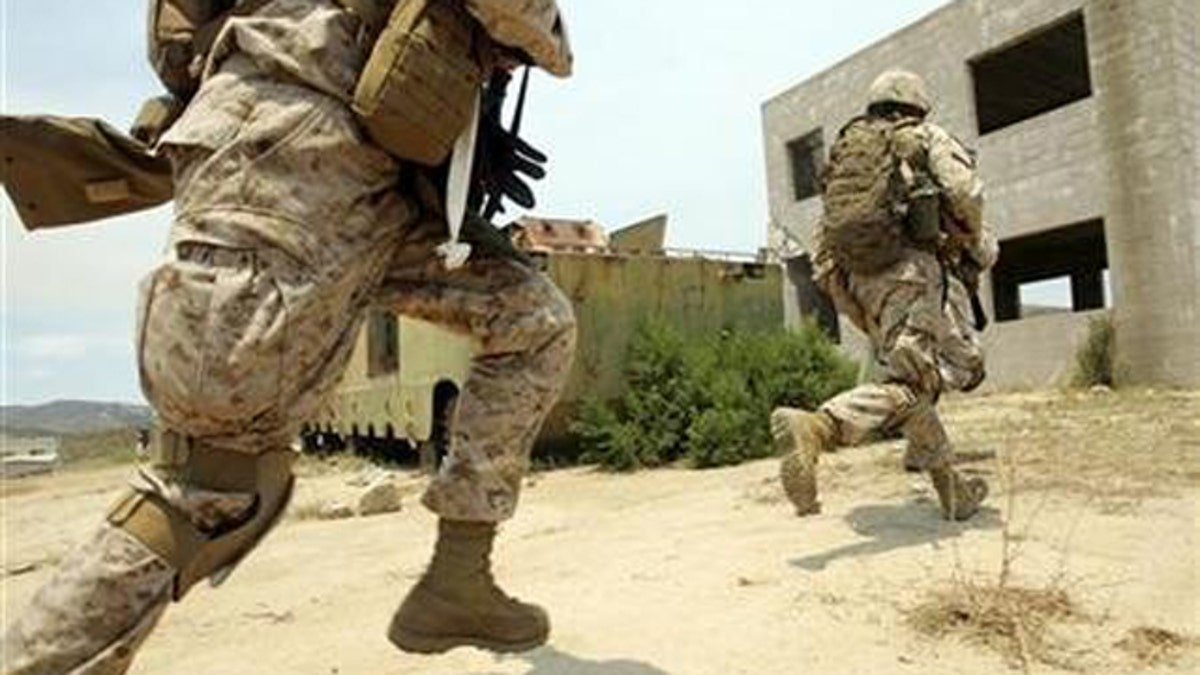
U.S. Marines conduct a search for insurgents during a training simulation of a search through an Iraqi city built at the U.S. Marine Base in Camp Pendleton. (Reuters)
Reservists returning from Iraq or Afghanistan may have more trouble adjusting to life at home than full-time soldiers do — and that can take a toll on their mental well-being, a UK study finds.
Past studies in both the UK and U.S. have found that, compared with regular troops, Reservists and National Guard members have more mental health issues — including more symptoms of post-traumatic stress disorder (PTSD) — after returning home from Iraq or Afghanistan.
The latest findings, researchers say, suggest that difficulty readjusting to civilian life may account for some of that extra risk.
Of the nearly 5,000 UK troops they surveyed, Reservists were more likely to say they'd had problems getting back to their normal social activities in the weeks after coming home.
A majority — 69 percent — also felt like other people did not understand what they had gone through during deployment. And they were less likely than regular troops to feel supported by the military.
What's more, the study found, Reservists who felt that lack of support — from civilian society or the military — were at greater risk of symptoms consistent with PTSD, anxiety, depression or alcohol abuse.
The reasons for Reservists' higher mental health risks have been tough to weed out, said Dr. Samuel B. Harvey, a psychiatrist at King's College London and lead researcher on the study.
"We don't think it is because Reservists are having a more dangerous time in Iraq or Afghanistan," he told Reuters Health in an email. "And while in the past, some Reservists have reported feeling unaccepted and underutilized within the military, this seems to have been less of a problem recently."
The current findings suggest that since Reservists are unique in having to navigate both military and civilian life, that may be an important factor, according to Harvey.
"The main message from this study," he said, "is that those who wish to help Reservists cope with the psychological impact of deployment need to not only focus on what happens during a tour of duty, but to consider what occurs after they return home."
The findings, reported in the Annals of Epidemiology, are based on surveys of 4,991 UK military personnel who were asked about their experiences in the weeks after coming home from Iraq and Afghanistan.
They also completed standard questions that gauge possible symptoms of PTSD, depression, anxiety and alcohol problems.
Of the 500 Reservists, 69 percent said they felt like people at home did not understand what they'd gone through overseas, versus 58 percent of regular troops. Just over one-third had trouble getting back to their regular social life, compared with 19 percent of regulars.
There were differences in Reservists' and regular troops' perceptions of support as well. Among the Reservists, 44 percent said they lacked support from the military, while the same percentage felt unsupported in civilian life.
Those figures were 30 percent and 37 percent, respectively, among regular troops.
Reservists' perceptions of support were also linked to their odds of mental health problems, the researchers found.
For example, PTSD symptoms were identified in 10 percent of Reservists who said they lacked support in civilian life — compared with only 0.3 percent of those who felt supported.
The findings do not prove that a lack of support is the cause of Reservists' mental health issues, according to Harvey. It could be that people with those symptoms are more likely to perceive a lack of support from others.
"We rarely know what 'causes' a particular case of mental illness," Harvey said, "as it is almost always due to a combination of factors."
The important thing, according to the researcher, is to be aware that Reservists commonly face problems with adjusting to life at home.
"Each Reservist will cope with their homecoming in their own way, but any activities which facilitate Reservists returning to their usual social networks and roles, and anything which makes them feel more supported, may be useful," Harvey said.
The militaries of both the UK and U.S. have started programs aimed at helping Reservists adjust after deployment.
In the U.S., one resource is Military OneSource (www.militaryonesource.com), where regular personnel and Reservists can find help with mental health counseling.
"The most important message for any Reservist who feels their mental health has suffered from deployment is to seek help early," Harvey said.
